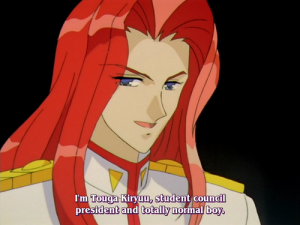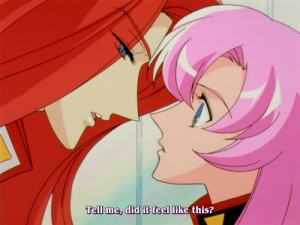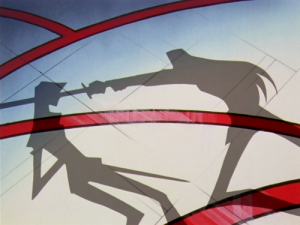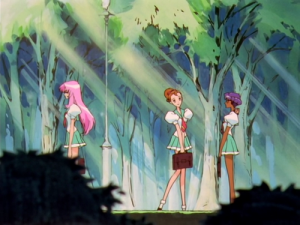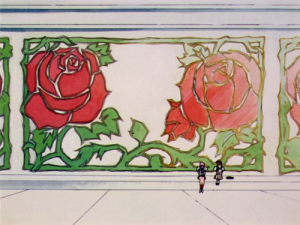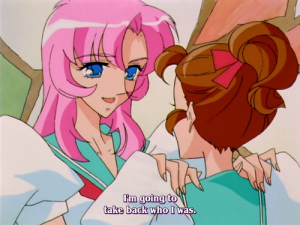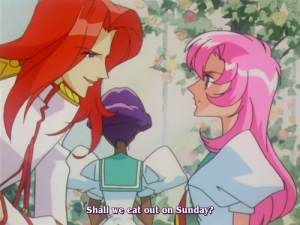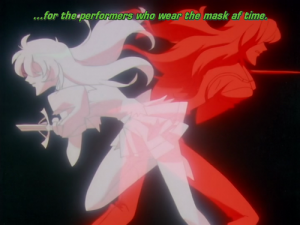The Four Horsemen of the Patriarchy: Part 5 Touga
Gender Essentialism and Exploitation
By Caitlin Moore
For more Fujoshi Feminism Articles, click here
Despite their positions of power, the members of the Student Council are largely self-destructive. Saionji has no control of his emotions, to the extent that it leads to his eventual downfall at the end of the Student Council arc. Miki is so idealistic and naïve that it poisons his relationships with those who don’t adhere to his views. Juri’s cynicism blinds her to the potential in others. Utena is able to defeat them not necessarily because of her own talent, but because of their fatal flaws.
But not Kiryuu Touga.
Touga is Akio’s right-hand man. He receives individual correspondence in addition to the same letters the as rest of the council. He is smart, manipulative, and perfectly conscious of his every action and choice. Because of this, he is the most dangerous of the student council members and very nearly Utena’s downfall.
Most elements of the patriarchy are insidious and drift below the surface of our consciousness: long-held societal views, biases, and assumptions that are learned at a very young age and are difficult to unlearn, even when one makes an effort. However, there are some men out there who see women as inherently different from men, even inferior, and do their best to force them into that role. A few even see the relationship between the sexes as antagonistic, and do everything in their power to exploit women for their own gain.
Touga watches Utena’s first duel, the one against Saionji, from a distance. As the bells ring out, he smiles down at her and says, “Oh baby, you’ve lit a fire in my heart.”
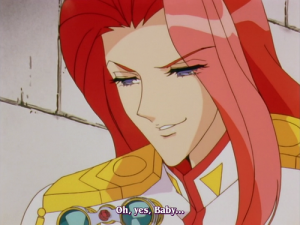 But it becomes increasingly clear that he has absolutely nothing heartfelt in mind for Utena. Instead, as the arc progresses, he does everything in his power to break her down psychologically and rebuild her as a second Rose Bride… and through his very conscious manipulation of her weaknesses and insecurities, very nearly succeeds.
But it becomes increasingly clear that he has absolutely nothing heartfelt in mind for Utena. Instead, as the arc progresses, he does everything in his power to break her down psychologically and rebuild her as a second Rose Bride… and through his very conscious manipulation of her weaknesses and insecurities, very nearly succeeds.
The first time he actually meets Utena, rather than watching her from afar, he inserts himself into her conversation uninvited, introducing himself as “Kiryuu Touga, Student Council president and totally normal boy.” He reaches out and runs his fingers through Utena’s hair with a confidence that betrays that he has performed this gesture on women unchallenged dozens of times. Utena, however, is no ordinary girl, to be cowed or flattered by his attentions, and instead slaps his hand away, rejecting his blatant invasion of her personal space. Touga, as a powerful, masculine figure, feels entitled to Utena’s time and attention, but she refuses to grant it to him.
He doesn’t give up here – rather, he seems to take it as a personal challenge. Instead, he takes it upon himself to invite her to a party, sending her a pink frilly dress that is in complete opposition to her usual androgynous style. She dons it reluctantly as moral support for Anthy, and Touga moves in once again. He showers her in compliments, commenting on what an attractive couple they make, once again physically engaging her without consent. This time, her resistance is much softer – a blushing, stammered objection. She is broken from Touga’s thrall when Anthy’s scream rouses her, reminding her of who she is and why she is there at the dance: to be a prince and provide support to her socially anxious friend, rather than to be subjected to the invasive advances of a man who doesn’t understand the meaning of the words “personal space”.
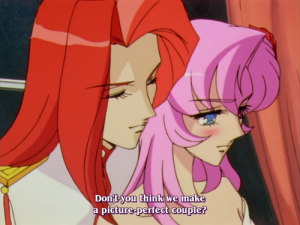
Touga treats everyone around him, especially the women, as playthings to be used in his plans. He plots and manipulates with no regard for the feelings, agency, or even humanity of those around him – his behavior is borderline sociopathic. When Saionji is expelled, Touga promises to take care of the exchange diary he shared with Anthy, but instead throws it into the fire and scoffs at him for being so foolish as to believe in friendship. Saionji has filled his role, and thus is no longer needed in Touga’s plot. He is, as Juri describes, the clown: not a funny one, but a tragic one, to be mocked and pitied for his misfortune, and then forgotten.
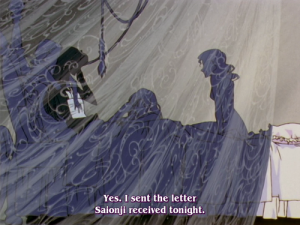
The purpose of all his plotting is twofold: to obtain the power of the Rose Bride for himself, and to destroy Utena’s confidence and force her into the role of Princess. Indeed, he forces everyone in his life into a pre-established archetypal role. He has even assigned himself a role: the hero, the leading man, the Prince. And there can’t be two princes, which is why Utena must be broken down and rebuilt into role he feels suits a girl better. Utena is threatening in her androgyny and her demand to be taken seriously and treated as an equal, all the while challenging those around her to break out of their pre-established roles as well. She is threatening to Touga’s masculinity the same way that many men are threatened by feminism. These men similarly try to take down feminists, albeit generally in a less calculating or competent manner. A fairly recent law of the internet states that the comments on any media about feminism justify feminism, and some years ago Maxim published an article titled “How to Tame a Feminist”, in which they advise men on how to soften up supposedly man-hating women, going from a laughably stereotypical and inaccurate feminist in a wifebeater and unshaven armpits to a woman in lingerie saying, “Your Camaro makes me hot.” He feels he must “fix” her: establish his dominance, put her in a dress, and force her into a feminine role.
Men are so threatened by powerful women for a reason that ties into the other half of the reason for Touga’s manipulation: they feel it diminishes their power. Anthy is the archetypal Princess, and if women can be Princes, that robs men of the institutional power to rescue, protect, and exploit women at will. Touga scoffs at Anthy’s chit-chat about how much fun it is, doing normal friend activities with Utena. “Your job isn’t to cook. All you need do is stay here and tend the roses. This birdcage is your domain, and you are the lovely little bird who stays within it. I wish to make this cage my own, and I would never let you out of it…ever.” All he desires is power: the power granted by the Rose Bride, and power over Anthy.
And so, Touga launches his master manipulation of Utena. He pits her against Nanami, who is so immature and unskilled she doesn’t stand the slightest hint of a chance. Instead, as she weeps against Touga’s chest over her loss, he can comfort her and look chivalrous to Utena. The next day, he spies on Utena lunching with Wakaba and Anthy, telling Miki that he is watching a “lonely princess”. Miki doesn’t understand what he’s talking about. “You cannot see it. Only I can,” Touga tells him. Miki sees Utena as a human being, not a stereotype, so he “cannot” see the gender role Touga feels she should fit. But Touga’s plan is already in motion, and when she approaches him in the rose garden, he outright states that he is her prince. At the beginning, Utena wouldn’t have bought his claim so easily, but now that he’s worked her over so thoroughly, she accepts it unquestioningly, and is shocked when he challenges her to a duel.
At first, Utena fights with her usual spirit, summoning the sword of Dios. She is startled by the ferocity with which Touga fights, but holds her own fairly well, even when Touga aims a vicious blow at her face. It is only when drops his guard that Utena remembers that he is supposedly her Prince and loses her resolve, creating an opening for him to strike the flower from her chest. “How lucky for you. Now you no longer have to be caught up in these unfathomable duels,” Touga gloats. To drive the knife deeper, he has Anthy tell Utena that she is happy being the Rose Bride. You were always wrong, is his message. Feminism is a lie, and women are happier when living according to their prescribed gender roles. You were just trying to force your ideals onto a blank slate.
Deeply depressed, with her usual boy’s uniform torn, Utena goes to school the next day in a sailor outfit. Her demeanor is meek and submissive, allowing Touga to touch her and ask her out even in front of Anthy. “This is normal, right?” she says, a question aimed at no one but herself. Touga is her Prince. He must be right. A girl can’t be a prince, so it’s better to just be a normal girl, doing feminine things like wearing dresses and going on dates and submitting to the advances of men. Touga, on the other hand, is thoroughly enjoying his victory. He accepts dates with other girls over the phone while at tea with his new fiancée, flirts with her at Student Council meetings – to the great discomfort of Juri and Miki – and even asks Utena out in front of her. After all, he is the prince, and a prince’s whim is law. Princes can do no wrong. He aims to display his prowess as a paragon of masculinity to all those around him, especially those uppity women who dared to defy him.
It is Wakaba, Utena’s best friend, who saves the day. Wakaba, an ordinary girl uninvolved with the duels, is confused and angered by Utena’s sudden transformation, blaming it on a fight with Anthy. Utena tries to tell her she doesn’t understand, that these are forces outside of her. “I want you to stop criticizing me,” Utena says. After all, Wakaba exists outside of the Prince/Princess/Witch paradigm. But it is her plain, no-nonsense, thoroughly ordinary girl input that saves Utena’s spirit. Wakaba doesn’t care about ideals or gender roles or revolutionizing the world; she sees that her best friend has been dealt a devastating blow, and wants things to go back to normal. She sees straight through the bullshit when Utena comments, “This is normal, right?” “Not being normal is normal for you! This sort of normal isn’t YOUR sort of normal!” Wakaba corrects her. “It’s like something’s been stolen from you and made you a coward! I don’t know what it is, but if you can get it back then get it!” These are the words that snap Utena back to herself, and she goes straight to the rose garden to challenge Touga to a duel. Wakaba, after all, knows Utena better than anyone else at Ohtori. She loves Utena exactly for who she is, androgyny and all, and can see that femininity is not right for her, and not making her happy. Touga tried to force Utena in a role because she is a woman, and Wakaba reminds Utena that she does not, in fact, have to conform.
Utena’s second duel with Touga, and the final one of the Student Council Saga, is the most difficult one she’s had to fight. Juri, now an ally in the face of Touga’s egregious chauvinism, gives Utena a sword, since she no longer has the Sword of Dios. Touga, on the other hand, wields the Sword of Dios, even bragging that he better knows how to unleash its true power: “Rose Bride! Abandon your body and protect the sword!” he orders, and Anthy kneels and kisses the tip of his sword, a gesture extremely reminiscent of fellatio, and the sword even begins to glow red. The camera pans slowly over it, emphasizing its length. How appropriate that the source of his power is visually similar to a sex act purely for the stimulation of the man, with no inherent gratification for the giver. Anthy, as the archetypal woman, devotes her self to supporting and protecting a dominant, oppressive man. And it’s true, Touga does wield and enormous amount of power, slicing effortlessly through Utena’s blade and shredding her uniform as she dodges his thrusts. The imagery throughout the battle is extremely sexual – Touga’s phallic source of power is literally destroying the clothing of his female opponent.
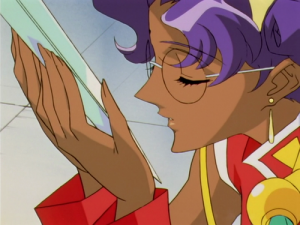
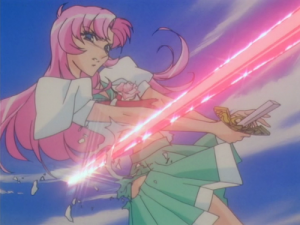 Anthy watches as a passive observer throughout the whole fight. She thinks on how she pities Utena, wondering at how she doesn’t realize how futile it is. She stands on the sidelines, expression unchanging, until Touga has Utena kneeling on the ground, mercilessly driving his blade through hers for a second time. Her eyes widen, and Dios’s silhouette flashes as she things, “It’s like what happened that time…” She sees Utena’s determination, even in the face of insurmountable challenges, and it reminds her of what true princeliness is. Her spell over the sword breaks, a tear falls from her eye, and Utena is able to throw Touga off and slice the flower from his pocket. “I’ve taken back what I was,” a victorious Utena tells Touga. It is through the power of women – Juri’s sword, Utena’s will, and Anthy’s emotions and memories – that he is defeated. It’s a fitting end for the most consciously misogynistic and manipulative of Utena’s opponents.
Anthy watches as a passive observer throughout the whole fight. She thinks on how she pities Utena, wondering at how she doesn’t realize how futile it is. She stands on the sidelines, expression unchanging, until Touga has Utena kneeling on the ground, mercilessly driving his blade through hers for a second time. Her eyes widen, and Dios’s silhouette flashes as she things, “It’s like what happened that time…” She sees Utena’s determination, even in the face of insurmountable challenges, and it reminds her of what true princeliness is. Her spell over the sword breaks, a tear falls from her eye, and Utena is able to throw Touga off and slice the flower from his pocket. “I’ve taken back what I was,” a victorious Utena tells Touga. It is through the power of women – Juri’s sword, Utena’s will, and Anthy’s emotions and memories – that he is defeated. It’s a fitting end for the most consciously misogynistic and manipulative of Utena’s opponents.
Follow fujoshifeminism.tumblr.com for more content and discussions. Agent Artemis also accepts suggestions, recommendations, and submissions through her tumblr.

